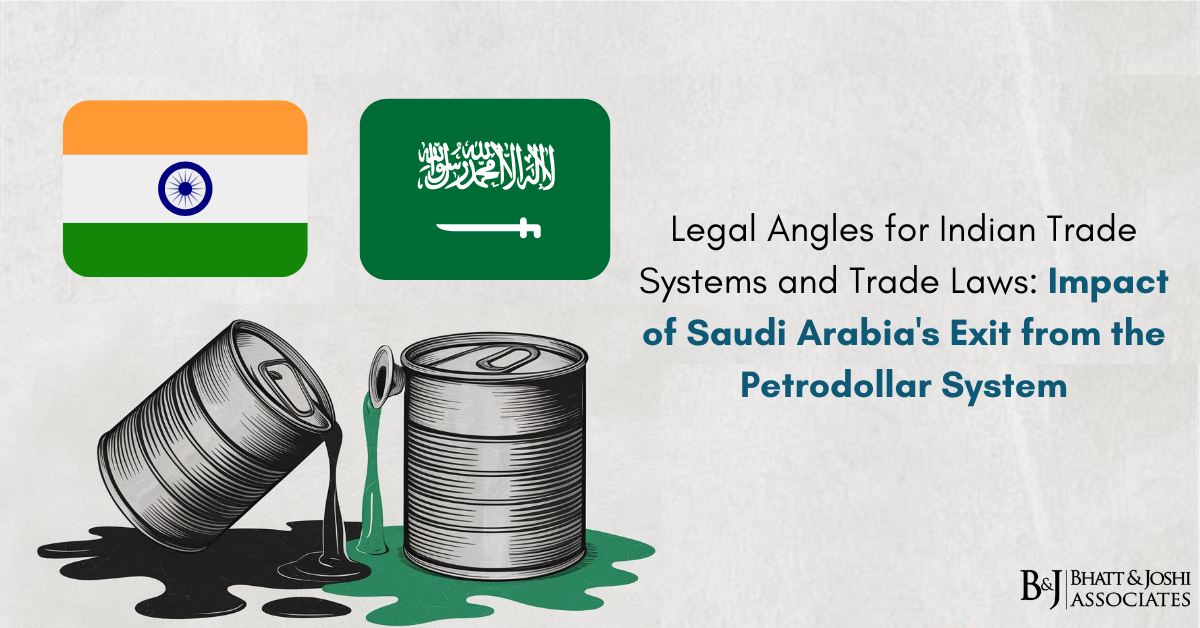Legal Angles for Indian Trade Systems and Trade Laws: Impact of Saudi Arabia’s Petrodollar Exit
Introduction
Saudi Arabia’s decision to exit the petrodollar system and trade oil in multiple currencies can have significant legal and economic implications for India’s trade systems and trade laws. As a major importer of Saudi oil, India must navigate these changes within the framework of its existing trade regulations and international trade agreements, considering the impact of Saudi Arabia’s Petrodollar Exit on India’s trade.
Legal Framework for Indian Trade
India’s trade system is governed by a complex legal framework that includes:
– Foreign Trade (Development and Regulation) Act, 1992: Governs the development and regulation of foreign trade by facilitating imports and augmenting exports.
– Customs Act, 1962: Regulates the import and export of goods, levy of duties, and the control over smuggling activities.
– Goods and Services Tax (GST) Act, 2017: Introduces a unified tax structure for goods and services, affecting trade logistics and pricing.
– Foreign Exchange Management Act (FEMA), 1999: Facilitates external trade and payments and promotes orderly development and maintenance of the foreign exchange market in India.
Impact of Saudi Arabia’s Petrodollar Exit on Indian Trade Systems and Laws
- Currency Diversification and Trade Agreements:
– Saudi Arabia’s acceptance of multiple currencies can lead to changes in how trade agreements are structured. Indian companies might negotiate oil contracts in Indian Rupees (INR) or other mutually agreeable currencies. This could reduce the reliance on USD for transactions, potentially lowering currency conversion costs and mitigating risks associated with USD volatility.
- Customs and Tariff Adjustments:
– India may need to adjust its customs and tariff policies to accommodate new trade dynamics. This could involve revising customs duties on oil and related products to reflect currency fluctuations and ensure that domestic markets remain stable.
- Amendments in FEMA Regulations:
– To facilitate smoother transactions in multiple currencies, the Reserve Bank of India (RBI) might need to amend FEMA regulations. This would include guidelines on how Indian businesses can hold and transact in foreign currencies other than USD, ensuring compliance with international trade practices.
- Impact on Bilateral Trade Agreements:
– India and Saudi Arabia might negotiate new bilateral trade agreements that specify terms for currency use, trade volumes, and pricing mechanisms. These agreements would need to be aligned with international trade laws and World Trade Organization (WTO) regulations to ensure legal robustness and global acceptance.
- GST and Tax Implications:
– Changes in trade practices due to currency diversification may also impact GST calculations. The valuation of imports and the determination of applicable taxes could become more complex, requiring clear guidelines from the GST Council to ensure consistency and compliance.
- Investment and Joint Ventures:
– Diversifying currency usage can attract more Saudi investments in India, particularly in infrastructure and technology sectors. Legal frameworks governing foreign direct investment (FDI) would need to adapt to facilitate these inflows, ensuring they are in line with India’s strategic economic goals.
Broader Economic Implications
- Enhanced Trade Relations:
– Currency diversification can strengthen India’s trade relations with Saudi Arabia, leading to more stable and predictable trade flows. This can benefit both countries economically and strategically, fostering closer economic ties and mutual growth.
- Reduction in Trade Deficit:
– By negotiating oil purchases in INR, India could potentially reduce its trade deficit. This would conserve foreign exchange reserves and provide greater economic stability.
- Boost to Domestic Industries:
– Enhanced economic cooperation can lead to joint ventures and technology transfers, boosting India’s domestic industries and contributing to the ‘Make in India’ initiative. Legal frameworks governing intellectual property rights and technology transfer would need to be robust to support these developments.
Conclusion: Adapting to the Impact of Saudi Arabia’s Petrodollar Exit
Saudi Arabia’s exit from the petrodollar system presents both challenges and opportunities for India. Adapting its trade systems and laws to these new dynamics can enhance India’s economic resilience and global trade standing. Legal reforms and strategic bilateral agreements will be crucial in navigating this transition smoothly and effectively.
 Whatsapp
Whatsapp


